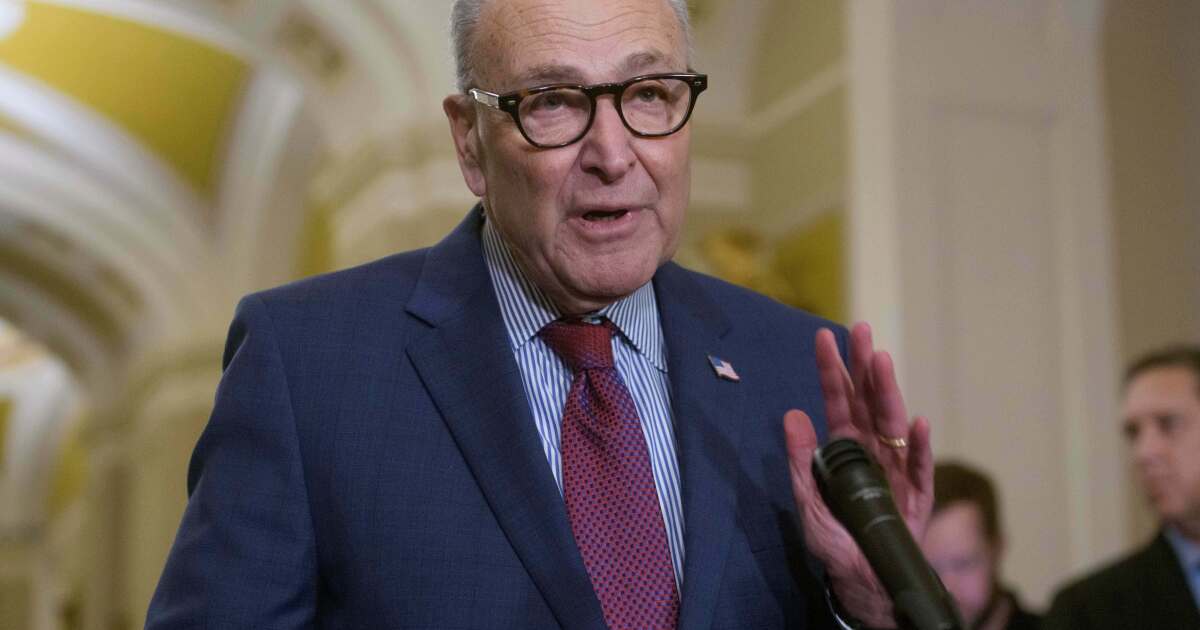Senate Democrats and White House strike deal to avert shutdown, continue ICE debate
WASHINGTON — Senate Democrats reached a deal with the White House late Thursday to prevent a partial government shutdown by moving to temporarily fund the Department of Homeland Security for two weeks, providing more time to negotiate new restrictions for federal immigration agents carrying out President Trump’s deportation campaign.
The deal follows widespread outrage over the fatal shootings of two U.S. citizens — Renee Nicole Good and Alex Pretti — by federal agents in Minneapolis amid an aggressive immigration crackdown led by the Trump administration.
Under the agreement, funding for the Department of Homeland Security will be extended for two weeks, while the Pentagon, the State Department, as well as the health, education, labor and transportation departments, will be funded through Sept. 30, Senate Minority Leader Chuck Schumer’s office confirmed to The Times.
While the Senate could approve the deal as early as Thursday night, it is unclear when the House will vote for the package. To avert a government shutdown, both chambers need to approve the deal by midnight EST Friday.
After the agreement was reached, President Trump wrote on Truth Social that he was “working hard with Congress to ensure that we are able to fully fund the Government without delay.”
“Republicans and Democrats in Congress have come together to get the vast majority of the Government funded until September, while at the same time providing an extension to the Department of Homeland Security (including the very important Coast Guard, which we are expanding and rebuilding like never before),” Trump said.
He added: “Hopefully, both Republicans and Democrats will give a very much needed Bipartisan ‘YES’ Vote.”
The move to temporarily fund DHS is meant to give lawmakers more time to negotiate Democratic demands that include a requirement that federal immigration agents use body cameras, stop using masks during operations and a push to tighten rules around arrests and searches without judicial warrants.
The breakthrough comes after Senate Democrats — and seven Senate Republicans — blocked passage of a spending package that included additional funding for DHS through Sept. 30 but not enough guardrails to muster the 60 votes needed to pass the chamber.
“Republicans in Congress cannot allow this violent status quo to continue,” Senate Minority Leader Chuck Schumer (D-N.Y.) said after the vote. “We’re ready to fund 96% of the federal government today, but the DHS bill still needs a lot of work.”
Speaking on the Senate floor, Sen. John Barrasso (R-Wyo.) condemned Democrats for jeopardizing funding for other agencies as they pushed for their demands.
“It would be disastrous to shut down FEMA in the middle of a major winter storm. It’s affecting half the country, and it appears that another storm is along the way,” he said. “A shutdown would mean no paychecks for our troops once again, no money for TSA agents or air traffic controllers.”
The standoff comes after federal ICE agents shot and killed Pretti, an American citizen and nurse who attempted to help a fallen woman during an ICE operation in Minneapolis. Pretti’s death was the second fatal shooting of a U.S. citizen by federal agents in the city in less than two weeks, following the killing of Good earlier this month.
